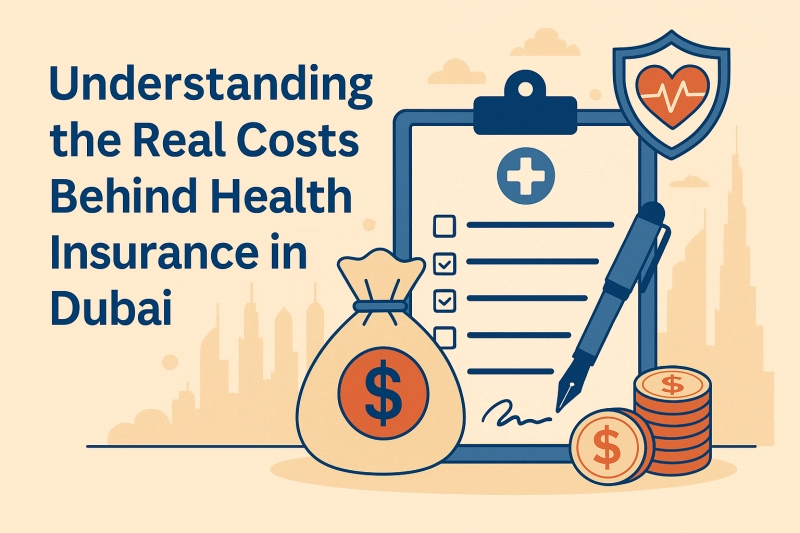Understanding the Real Costs Behind Health Insurance
Compulsory health insurance in Dubai is essential. However, truly grasping the costs involves looking beyond the premium. Many factors influence your actual healthcare spending. This means understanding both the obvious and the less apparent expenses.
Deciphering Premium Variations
Several factors contribute to your health insurance premium cost in Dubai. Age is a primary one, with older individuals often facing higher premiums. Pre-existing conditions also play a significant role, potentially increasing your risk profile for insurers.
Your plan type also significantly impacts the premium. A basic plan will typically cost less than a comprehensive plan with broader coverage. However, simply opting for the cheapest plan isn't always the wisest strategy.
Hidden costs can significantly impact your total healthcare expenses. Two seemingly similar plans might have vastly different co-payments, deductibles, and network restrictions.
A lower premium plan could have higher co-payments for doctor visits. It might also require you to meet a substantial deductible before coverage begins. Network restrictions can limit your choice of healthcare providers. This can potentially lead to seeking more expensive out-of-network care. These seemingly minor details can accumulate significantly over time. It's essential to consider the complete financial picture of healthcare coverage.
Unmasking Hidden Costs
Beyond premiums, several overlooked costs can significantly affect your total healthcare spending. Co-payments, the set amount you pay for a medical service, can accumulate, especially with frequent doctor visits or specialist consultations.
Deductibles, the amount you pay out-of-pocket before your insurance coverage activates, can create a substantial financial burden if you require extensive medical care. Dubai's healthcare sector is experiencing rising demand due to the expansion of mandatory health insurance across the UAE.
Since January 2025, residents of the Northern Emirates have been seeking care in Dubai, taking advantage of its advanced medical facilities. This influx highlights Dubai's healthcare capacity to serve a wider regional population. Explore this topic further. This increased demand can influence healthcare service pricing and availability in Dubai.
Comparing Costs Across Emirates
Comparing health insurance costs across different emirates offers valuable insights. While compulsory health insurance now applies across the UAE, premium costs can differ significantly between Dubai and the Northern Emirates.
Several factors contribute to these variations, including differences in the cost of living, healthcare infrastructure, and the prevalence of specific health conditions. Understanding these regional disparities is crucial for individuals and businesses when budgeting for healthcare. This knowledge allows for informed decisions when selecting a plan and managing overall healthcare costs.
Ultimately, a comprehensive understanding of the real costs associated with health insurance empowers residents to make informed choices for their health and financial well-being.
Employer's Roadmap to Foolproof Insurance Compliance
Compulsory health insurance in Dubai isn't just a legal requirement; it's a vital investment in your employees and a cornerstone of successful business operations. This section guides you through building a robust insurance program that adheres to all Dubai Health Authority (DHA) requirements, safeguarding your business and your team.
Creating a compliant insurance program requires a structured approach. First, understand the Essential Benefits Plan (EBP), the DHA-mandated minimum coverage standard for all employees. Familiarize yourself with the specific benefits included in the EBP to ensure your chosen plan meets these requirements.
Next, establish a clear enrollment process for new hires. This includes providing detailed information about the plan, its coverage, and a smooth enrollment procedure. A well-designed process ensures new employees are covered from their start date, minimizing compliance gaps. For further insights, read more about the benefits of group medical insurance: How Does Group Medical Insurance Benefit Employers?
Effective policy renewal management is also critical. Implement a system for timely renewals to prevent coverage lapses, which could involve automated reminders and close collaboration with your insurance provider. Proactive renewal management avoids penalties and ensures continuous coverage.
Finally, maintain meticulous documentation. Keep detailed records of employee enrollments, renewals, and any changes to coverage. Organized records simplify audits and demonstrate your commitment to regulatory compliance.
Navigating Common Compliance Pitfalls
Even diligent employers can encounter compliance challenges. A common issue is new hire transitions. Delays in enrollment can create periods of non-compliance. Implement systems that ensure immediate coverage from the employee's start date.
Managing dependent coverage can also be complex. Clearly communicate the options available to employees for covering their families, offering support during the enrollment process. This clarity ensures dependents receive the necessary coverage without confusion or delays.
Understanding different plan types presents another potential pitfall. While the EBP sets the minimum standard, employers often offer enhanced plans. Thoroughly understand the specifics of your chosen plan, including its coverage limits and any exclusions, to prevent unexpected gaps in coverage.
Best Practices for Seamless Compliance
Successful Dubai companies often share several best practices. Building strong relationships with insurance providers fosters clear communication, enabling faster issue resolution and providing valuable insights into regulatory changes.
These companies also prioritize cost optimization without compromising coverage. They carefully analyze employee demographics and healthcare needs to select plans that offer the best value while ensuring comprehensive access to healthcare.
Finally, they recognize that regulations evolve. Maintaining a proactive approach to compliance and staying informed about DHA updates and insurance legislation ensures they're always prepared for any regulatory shifts.
To summarize key compliance requirements, let's look at the following table:
Employer Compliance Requirements for Health Insurance in Dubai
This table outlines key employer responsibilities, compliance deadlines, and potential penalties related to providing mandatory health insurance in Dubai.
| Compliance Requirement | Deadline/Timeframe | Responsible Entity | Potential Penalties for Non-compliance |
| Employee Enrollment | Within 30 days of employment start date | Employer | Fines, potential business license suspension |
| Policy Renewal | Before the policy expiration date | Employer | Coverage lapse, potential fines |
| Dependent Coverage | As per employee's chosen plan and timeframe | Employer/Employee | Dependent healthcare costs may not be covered |
| Documentation Maintenance | Ongoing | Employer | Difficulties during audits, potential fines |
This table provides a clear framework for developing a robust health insurance program. Understanding these responsibilities and adopting proactive strategies ensures compliance with DHA mandates and safeguards your workforce. Staying informed and maintaining a strong relationship with your insurance provider will help you navigate the complexities of compulsory health insurance effectively.








